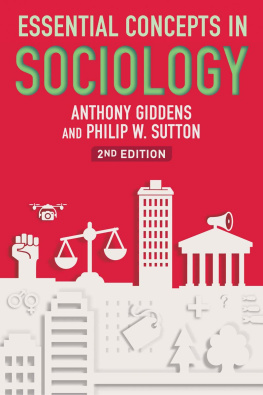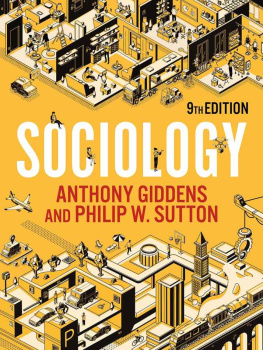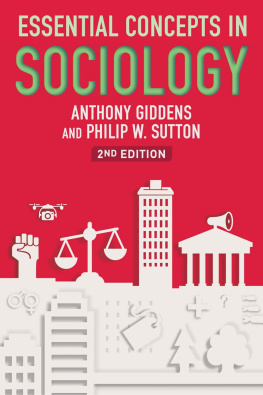Anthony Giddens - Introduction to Sociology (12th Edition)
Here you can read online Anthony Giddens - Introduction to Sociology (12th Edition) full text of the book (entire story) in english for free. Download pdf and epub, get meaning, cover and reviews about this ebook. year: 2021, publisher: W. W. Norton & Company, genre: Politics. Description of the work, (preface) as well as reviews are available. Best literature library LitArk.com created for fans of good reading and offers a wide selection of genres:
Romance novel
Science fiction
Adventure
Detective
Science
History
Home and family
Prose
Art
Politics
Computer
Non-fiction
Religion
Business
Children
Humor
Choose a favorite category and find really read worthwhile books. Enjoy immersion in the world of imagination, feel the emotions of the characters or learn something new for yourself, make an fascinating discovery.
- Book:Introduction to Sociology (12th Edition)
- Author:
- Publisher:W. W. Norton & Company
- Genre:
- Year:2021
- Rating:5 / 5
- Favourites:Add to favourites
- Your mark:
- 100
- 1
- 2
- 3
- 4
- 5
Introduction to Sociology (12th Edition): summary, description and annotation
We offer to read an annotation, description, summary or preface (depends on what the author of the book "Introduction to Sociology (12th Edition)" wrote himself). If you haven't found the necessary information about the book — write in the comments, we will try to find it.
Introduction to Sociology (12th Edition) — read online for free the complete book (whole text) full work
Below is the text of the book, divided by pages. System saving the place of the last page read, allows you to conveniently read the book "Introduction to Sociology (12th Edition)" online for free, without having to search again every time where you left off. Put a bookmark, and you can go to the page where you finished reading at any time.
Font size:
Interval:
Bookmark:

W. W. NORTON & COMPANY has been independent since its founding in 1923, when William Warder Norton and Mary D. Herter Norton first published lectures delivered at the Peoples Institute, the adult education division of New York Citys Cooper Union. The firm soon expanded its program beyond the Institute, publishing books by celebrated academics from America and abroad. By midcentury, the two major pillars of Nortons publishing programtrade books and college textswere firmly established. In the 1950s, the Norton family transferred control of the company to its employees, and todaywith a staff of four hundred and a comparable number of trade, college, and professional titles published each yearW. W. Norton & Company stands as the largest and oldest publishing house owned wholly by its employees.
Copyright 2020, 2018, 2016, 2014, 2012, 2009 by Anthony Giddens, Mitchell Duneier, Richard P. Appelbaum, and Deborah Carr
Copyright 2007, 2005, 2003 by Anthony Giddens, Mitchell Duneier, and Richard P. Appelbaum
Copyright 2000 by Anthony Giddens and Mitchell Duneier
Copyright 1996, 1991 by Anthony Giddens
All rights reserved
Editor: Michael Moss
Editorial Assistant: Angie Merila
Project Editor: Caitlin Moran
Managing Editor, College: Marian Johnson
Managing Editor, College Digital Media: Kim Yi
Production Manager: Stephen Sajdak
Media Editor: Eileen Connell
Associate Media Editor: Ariel Eaton
Media Project Editor: Danielle Belfiore
Media Editorial Assistant: Alexandra Park
Ebook Production Manager: Sophia Purut, Megan Crayne
Marketing Manager, Sociology: Julia Hall
Interior Design: Marisa Nakasone
Design Director: Rubina Yeh
Photo Editor: Catherine Abelman
Permissions Consultant: Elizabeth Trammell
Director of College Permissions: Megan Schindel
Composition: Graphic World
Library of Congress Cataloging-in-Publication Data
Names: Giddens, Anthony, author. Title: Introduction to sociology / Anthony Giddens, London School of Economics, Mitchell Duneier, Princeton University, Richard P. Appelbaum, University of California, Santa Barbara, Deborah Carr, Boston University.
Description: Seagull 12e [edition] | New York : W.W. Norton & Company, [2021] | Includes bibliographical references and index.
Identifiers: LCCN 2020047531 | ISBN 9780393428216 (paperback) |
9780393537963(epub)
Subjects: LCSH: Sociology.
Classification: LCC HM585 .G53 2021 | DDC 301--dc23
LC record available at https://lccn.loc.gov/2020047531
Ebook version: 12.1-retailer
We wrote this book with the belief that sociology plays a key role in modern intellectual culture and occupies a central place within the social sciences. We have aimed to write a book that combines classic theories of sociology with empirically grounded studies and examples from real life that reveal the basic issues of interest to sociologists today. The book does not bring in overly sophisticated notions; nevertheless, ideas and findings drawn from the cutting edge of the discipline are incorporated throughout. We hope it is a fair and nonpartisan treatment; we endeavored to cover the major perspectives in sociology and the major findings of contemporary American research in an evenhanded, although not indiscriminate, way.
The book is constructed around eight basic themes, each of which helps give the work a distinctive character. One of the central themes is the micro and macro link. At many points in the book, we show that interaction in micro-level contexts affects larger, or macro-level, social processes, and that these macro-level processes influence our day-to-day lives. We emphasize that one can better understand a social situation by analyzing it at both the micro and macro levels.
A second theme is that of the world in change. Sociology was born out of the transformations that wrenched the industrializing social order of the West away from the ways of life that characterized earlier societies. The world created by these changes is the primary object of sociological analysis. The pace of social change has continued to accelerate, and it is possible that we stand on the threshold of transitions as significant as those that occurred in the late eighteenth and nineteenth centuries. Sociology has prime responsibility for charting the transformations of the past and grasping the major lines of development taking place today.
Another fundamental theme is the globalization of social life. For far too long, sociology has been dominated by the view that societies can be studied as independent and distinct entities. But even in the past, societies never really existed in isolation. In current times, we can see a clear acceleration in processes of global integration. This is obvious, for example, in the expansion of international trade across the world, or the rapid spread of the deadly coronavirus disease around the globe. The emphasis on globalization also connects closely with the interdependence of the industrialized and developing worlds today.
The book also focuses on the importance of comparative study. Sociology cannot be taught solely by understanding the institutions of any one particular society. Although we have focused our discussion primarily on the United States, we have balanced it with a rich variety of materials drawn from other cultures. These include research carried out in other Western countries and in Russia and eastern European societies, which are currently undergoing substantial changes. The book also includes much more material on developing countries than has been usual in introductory texts. In addition, we strongly emphasize the relationship between sociology and anthropology, whose concerns often overlap. Given the close connections that now mesh societies across the world and the virtual disappearance of many types of traditional social systems, sociology and anthropology have increasingly become indistinguishable.
A fifth theme is the necessity of taking a historical approach to sociology. This involves more than just filling in the historical context within which events occur. One of the most important developments in sociology over the past few years has been an increasing emphasis on historical analysis. This should be understood not solely as applying a sociological outlook to the past but as a way of contributing to our understanding of institutions in the present. Recent work in historical sociology is discussed throughout the text and provides a framework for the interpretations offered in the chapters.
Throughout the text, particular attention is given to a sixth themeissues of social class, gender, and race. The study of social differentiation is ordinarily regarded as a series of specific fields within sociology as a wholeand this volume contains chapters that specifically explore thinking and research on each subject (, respectively). However, questions about gender, race, and class relations are so fundamental to sociological analysis that they cannot simply be considered subdivisions of the field. Thus many chapters contain sections concerned with the ways that multiple sources of social stratification shape the human experience.
A seventh theme is that a solid grasp of sociological research methods is crucial for understanding the world around us. A strong understanding of how social science research is conducted is crucial for interpreting and making sense of the many social facts that the media trumpet.
Font size:
Interval:
Bookmark:
Similar books «Introduction to Sociology (12th Edition)»
Look at similar books to Introduction to Sociology (12th Edition). We have selected literature similar in name and meaning in the hope of providing readers with more options to find new, interesting, not yet read works.
Discussion, reviews of the book Introduction to Sociology (12th Edition) and just readers' own opinions. Leave your comments, write what you think about the work, its meaning or the main characters. Specify what exactly you liked and what you didn't like, and why you think so.









